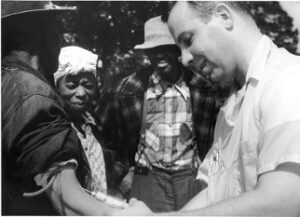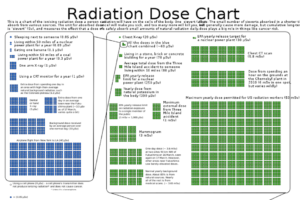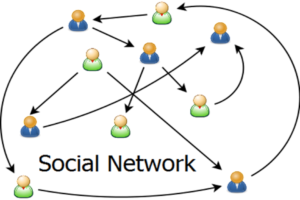
Source: Nicolas Raymond, CC BY 2.0
A few years ago, the world was celebrating the end of a decade and preparing to welcome the new ‘roaring 20s’. But just a few months later, the world had shut down in efforts to curb the widespread transmission of the novel coronavirus. Now, a little more than three years on, the world is re-emerging and rebuilding from the pandemic that has drastically impacted the lives of billions and has changed how the globe operates forever. The pandemic has brought to light many issues that may not have been previously discussed or considered in the way they should have been. Mental health awareness and destigmatizing mental illnesses are issues that have received more priority in the past few years, and along with these issues, a conversation around intergenerational trauma has ensued. Intergenerational trauma is not a new term but has become better known in the past few years. Several months into the Covid lockdowns, the world saw widespread protests as a response to social and racial injustice. This led to others speaking out about the trauma in communities, particularly minority communities, and how the effects of events decades ago may have impacted those living today.
One of the very first mentions of intergenerational trauma was in 1966, when Dr. Vivian M. Rakoff and colleagues studied the psychological distress that was seen in the children of Holocaust survivors1. Since then, there have been a number of studies in which intergenerational trauma has been explored in different contexts. However, the field is still relatively young and findings relatively new. This article outlines some of these recent publications and sheds light on how intergenerational trauma research is evolving.
In a study involving Holocaust survivors and their children, researchers explored how the effects of trauma can be passed on through the generations. Specifically, they saw evidence of methylation patterns in the FKBP5 gene that were shared between Holocaust survivors and their children. Methylation is a form of ‘epigenetic inheritance’, where events during one’s lifetime, in this case experiencing the holocaust, alter the way that genes are expressed. Methylation markers, which typically act to suppress gene expression, may have significant physiological consequences. And these physiological consequences can carry on through the generations, as methylation patterns can be passed on from parents to their children, as seen in this study2.
In addition to understanding how intergenerational trauma is transmitted, other studies have highlighted the heartbreaking visible effects of intergenerational trauma. For example, the Indian Subcontinent has been marred with centuries worth of trauma, as the population and diaspora struggle with the lasting effects of imperialism. Researchers have shown that for the diaspora, the effects of casteism, sexism, and somewhat harmful traditional values that look down on seeking help are all sources of pain and stress, especially among women3. Furthermore, India today has one of the worst mental health crises in the world, with suicide being the leading cause of death in 15-29 year olds4.
On the American continent, the remains of more than 1000 children of residential schools were found in 2021. The survivors and children of the survivors have spoken out about the horrors of residential schools in the US and Canada. As of 2019, two prominent studies have been published, highlighting the emotional and psychological distress shown by the survivors’ children and grandchildren. Suicide attempts, hepatitis C stemming from drug use, and learning difficulties were all noted as common struggles. These were all less common in a control group of children whose parents did not attend these schools1.
In the United States specifically, African Americans are impacted by the after-effects of slavery and racial discrimination. However, there aren’t many studies yet that deeply explore this intergenerational trauma, even though numerous studies suggest that African Americans suffer from higher rates of PTSD than the general population5. Dr. Monica Williams of the University of Connecticut developed an assessment that would measure the effects of racial discrimination on African American students. Of the 123 African American (monoracial and biracial) students that took the assessment, the results showed that they often experienced hyperarousal, worries about the futures, feelings of alienation, and perceiving others as dangerous5.
War and genocide are other sources of intergenerational trauma. Beyond the Holocaust, researchers have begun to study the after-effects of other genocides. The Rwandan genocide occurred in 1994, spanning 100-days and taking the lives of nearly a one million people. Women suffered tremendous sexual violence, leading them face extreme marginalization and along with it panic, PTSD, depression, shame, and a loss of hope. The maternal trauma and stress the women dealt with was passed on to their children, and they dealt with the intergenerational trauma of the horrific event6.
Finally, returning to the topic of COVID-19, the pandemic will have a long-lasting negative psychological impact for many who lived through it. And given the findings of researchers studying intergenerational trauma, some of these psychological effects may well be handed down through generations. On top of the pandemic, the people of Ukraine have faced invasion and war, causing millions to flee their homes and lose everything overnight. Women and children especially are at severe risk of brutality and trauma, and this too will have intergenerational effects7.
Only now are the full effects of intergenerational trauma being understood, and it is important that further research is done not just to reveal more about it, but to also understand what the healing process can look like so those who struggle from the effects of past generational trauma can heal.
References
- DeAngelis, Tori. “The Legacy of Trauma.” Monitor on Psychology, American Psychological Association, Feb. 2019, https://www.apa.org/monitor/2019/02/legacy-trauma.
- Yehuda R;Daskalakis NP;Bierer LM;Bader HN;Klengel T;Holsboer F;Binder EB; (n.d.). Holocaust exposure induced intergenerational effects on FKBP5 methylation. Biological psychiatry. Retrieved August 19, 2022, from https://pubmed.ncbi.nlm.nih.gov/26410355/
- Sai, et al. “On South Asian Women and Intergenerational Trauma.” North Carolina Asian Americans Together, 30 June 2021, https://ncaatogether.org/2021/06/30/on-south-asian-women-and-intergenerational-trauma/.
- Srivastava, Kalpana, et al. “Mental Health Awareness: The Indian Scenario.” Industrial Psychiatry Journal, Medknow Publications & Media Pvt Ltd, 2016, https://www.ncbi.nlm.nih.gov/pmc/articles/PMC5479084/.
- Williams, Monnica T., et al. “Assessing Racial Trauma with the Trauma Symptoms of Discrimination Scale.” Psychology of Violence, vol. 8, no. 6, 2018, pp. 735–747., https://doi.org/10.1037/vio0000212.
- Kahn, Sarilee, and Myriam Denov. “Transgenerational Trauma in Rwandan Genocidal Rape Survivors and Their Children: A Culturally Enhanced Bioecological Approach.” Transcultural Psychiatry, 2022, p. 136346152210802., https://doi.org/10.1177/13634615221080231.
- United Nations. (n.d.). Ukraine War: Trauma ‘risks destroying a generation’, Security Council hears | | UN news. United Nations. Retrieved August 19, 2022, from https://news.un.org/en/story/2022/04/1116022
Related Posts
How Many Humans Does it Take to Host a Planet?
Figure 1: This is an artist’s rendering of a potential...
Read MoreCOVID-19 Clinical Trials and Racial Disproportionality
Figure 1: A doctor drawing blood from a patient as...
Read MoreMedical Overtreatment in the United States: Causes, Consequences, and Solutions
This article was originally submitted to the Modern MD competition...
Read MoreWhen the Going gets Tough, the Close start Nearing: Networks and External Stress
Figure: A Social Network (Wikimedia Commons, Author Zigomitros Athanasios –...
Read MoreChildhood Unpopularity May Increase Risk of Cardiovascular Disease in Adulthood
Figure 1: Childhood experiences are widely considered to affect adult...
Read MoreVaping and Mental Fog – The Connection Between E-Cigarette Use and Mental Function
Figure 1: Use of e-cigarette devices, like the one in...
Read MoreFeba Varughese






